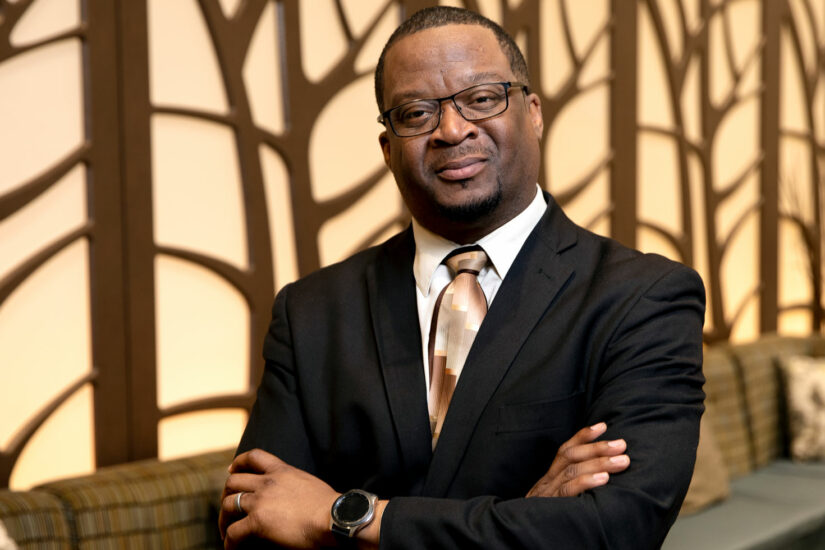
The Confidence to Ask
Fundraising School gives nonprofits the tools, training to seek donor support.
By Gene Rebeck | Photography by Paul Middlestaedt
Nonprofits rely on fundraising to build a sustainable organization, yet asking for donations can be fraught with doubt and uncertainty. Pastor James Alberts, founder and CEO of Higher Works Collaborative, knows the struggle all too well.
Since its founding in 2017, Higher Works Collaborative has provided a growing suite of services primarily for the Greater St. Cloud area Black community. Its programs support entrepreneurship, transportation, housing, employment and more. “We’re growing to the need that is out there,” said Alberts. “And the need is great.”
With demand on the rise, Alberts found he had a need of his own—to take his organization’s fundraising to a higher level. To get there, Alberts joined the first cohort of the Fundraising School, a program launched in the spring of 2021 by the Initiative Foundation and Staples-based Sourcewell. A second, smaller cohort of six nonprofit leaders providing support to Black, Indigenous and people of color was offered during the pandemic.
Alberts and his fellow students have profited from the program. Through its two cohorts (a third will be under way this spring), the Fundraising School has provided more than two dozen regional nonprofits with strategies to address a necessary but sometimes daunting task: fundraising. Collectively, the 27 graduates of the first two cohorts raised more than $1 million to support their missions—and the people they serve.
LEARNING NEW LESSONS
“During the pandemic, everyone had to look at different ways of working and to secure funding that supports the mission,” said Tammy Filippi, Sourcewell community solutions specialist. “What we’ve found—and this is nationwide—is that those nonprofits that stay connected to their donors often receive funding if they actually ask for it.”
Since 2001, the Initiative Foundation has offered programming to help strengthen the region’s 1,700 nonprofits with better management, governance, planning and fund development. Several years ago, the Foundation and Sourcewell partnered on the development of a digitally-based fundraising program called Jumpstart. The program had its successes, said Zach Tabatt, nonprofit development program officer at the Initiative Foundation. “What we found was that a lot of the nonprofits from smaller communities—really, all of our service area—didn’t have the capacity to spend as much time as the program’s software required.”
So it was back to the drawing board. Tabatt and his team preserved the best features of the Jumpstart program and formed a new partnership with Rachel Ramjattan and her consultancy, Nonprofit Plus.
OPPORTUNITIES FOR DONORS
Ramjattan started Nonprofit Plus in 2015 as a way to give nonprofits actionable plans they could put to work right away.
“I was concerned that a lot of nonprofits that are doing the most meaningful and impactful work don’t really get a fair shake in terms of funding,” she said. What’s more, they often lack the confidence needed to approach potential donors.
In launching Nonprofit Plus, Ramjattan put to work what she learned in her fundraising career. For example, she was often frustrated by fundraising consultants who focused on processes and theory rather than practical strategies.
The Fundraising School features six weekly four-hour sessions. Participants develop a technology plan, a case for support, a monthly giving and donor engagement plan, a special events or peer-to-peer campaign, a board recruitment and engagement plan, and a data-driven fundraising plan.
Ramjattan also encourages nonprofit leaders to reframe their fundraising perspective. Smaller nonprofits, in particular, often are nervous about asking for donations. However, they can overcome their reservations by seeing their relationship with donors as a partnership for doing good in the community. “You are giving people the opportunity to change the world in ways that are meaningful to them,” Ramjattan said. “That’s the difference between begging and philanthropy.”
Central to this change in philosophy is developing long-lasting relationships with donors who can potentially provide ongoing funding. Rather than one-off grants, nonprofits learn how to build a base of loyal supporters so they can rely on a steady level of income to fund their work.
Having a predictable income stream contributes to long-term sustainability. It also helps to attract new donors and enables nonprofits to offer wages and benefits that attract and retain the talent they need.
BEARING NEW FRUIT
Even before Fundraising School had concluded, Alberts and Higher Works Collaborative were able to secure $150,000 in new donations to support summer programming and another $525,000 in ongoing funding over the next 42 months.
The infusion of financial support has allowed Higher Works Collaborative to expand its services and hire local professionals who might otherwise commute to the Twin Cities. They’re paid competitive salaries and can do their good work in the St. Cloud community—exactly where they’re needed.
With his confidence bolstered and a clear and compelling story to share with donors about the good that Higher Works Collaborative does for the community it serves, Alberts is optimistic about the future. “I still don’t know everything,” he said. “But I’m much better educated on the vocabulary and the processes.”